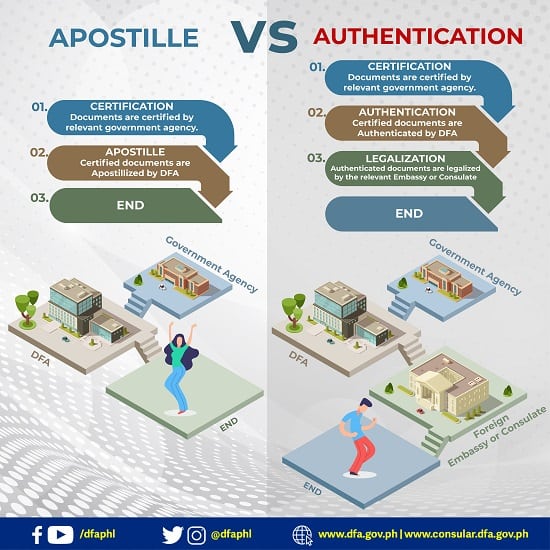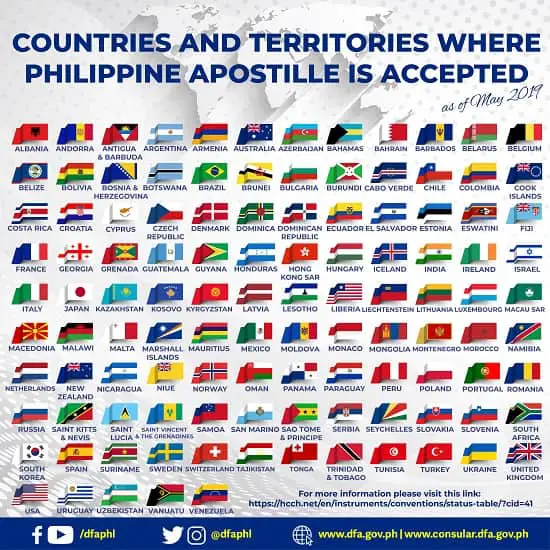Posted by: AdminMH
Aug 04, 2019
Birth certificates in the Philippines and those issued by other countries don’t look the same. They’re also not processed in the same way.Aside from processing Philippine passports, the Department of Foreign Affairs (DFA) is also tasked with authenticating documents.
Formerly known as “red ribbon” authentication, the process involved affixing red satin ribbons to public documents that will be used abroad.
Starting June 17, 2019, however, DFA has officially stopped issuing “red ribbons” which have been replaced by “Apostille” certificates following Philippines’ accession to the Apostille Convention.
What exactly is an Apostille certificate and how does it differ from the “red ribbon” certificates we’re all familiar with?
In this guide, we’ll cover everything about this new authentication process and how it has made processing documents to be used abroad easier than ever before.
Let’s say you have a PSA birth certificate.
So how can a foreign country accept a document (in this case, a birth certificate) from a completely different country with completely different laws and culture?
This is when authentication enters the picture.
Since the 1963 Vienna Convention on Consular Relations, embassies or consulates around the world have been following the same authentication procedure to ensure that a document processed in a particular country will remain valid in another country.
For this reason, the purpose of having your documents authenticated by DFA is to ensure embassies or consulates in other countries that the said documents have been carefully reviewed, examined, and subjected to an agreed upon authentication procedure.
In other words, the DFA authentication guarantees foreign embassies that whatever document you’re submitting is not fake and was released by a recognized Philippine government agency.
Filipinos have grown familiar with “red ribbons” that whenever their foreign employers ask them to authenticate certain documents, they immediately associate this procedure with “red ribbons.”
However, starting June 17, 2019, DFA has stopped issuing “red ribbon” certificates to authenticate public documents that will be used abroad.
The “red ribbons” have been replaced by Apostille certificates. This new procedure isn’t intended to confuse people as some have been led to believe. Rather, it’s designed to streamline the authentication process.
Let me explain.
On September 12, 2018, the Philippines formally acceded to the Apostille Convention held in The Hague, Netherlands.
The Apostille Convention is basically an international treaty where all signatory countries came to an agreement that documents issued by one signatory country can be accepted by another signatory country without undergoing additional consular authentication.
Now, this is what makes the Apostille certificate different from the discontinued “red ribbon” certificates.
In the old system (see image below), you can’t use a Philippine-issued document abroad unless it’s authenticated by DFA and then legalized by the Foreign Embassy with jurisdiction over the country where the document will be used.

By contrast, the Apostille certificate enables Filipinos to use their authenticated documents in any Apostille-contracting countries without going through another consular authentication or legalization procedure.
In other words, you only need to go to the DFA to get your documents authenticated. There’s no longer a need to go to the Consular Office of your destination country, making the whole process easier, faster, and relatively cheaper.
As mentioned previously, an Apostille certificate issued by DFA in the Philippines is only accepted by other countries who are also signatories to the Apostille Convention.
For a complete list of Apostille-contracting countries, please check out this link or see the image below.

In addition to the countries NOT included above, Apostille certificates are also NOT accepted in Austria, Germany, Greece, and Finland.
The Department of Foreign Affairs (DFA) offers authentication services for the following documents:
Before going to the DFA office, ensure that you already have the following documentary requirements:
You can bring any one of the following:
Birth/Marriage/Death Certificate/Certificate of No Marriage Record and/or Negative Records (CENOMAR).
Transcript of Records (TOR) and Diploma (For State Colleges and Universities).
Transcript of Records (TOR) and Diploma (Private Schools and Local Universities and Colleges).
Transcript of Records (TOR) and Diploma / National Certificate (Technical or Vocational Courses).
Form 137 and Diploma (High School and Elementary Level).
Medical/AIDS-Free Certificate.
Civil Aviation Authority of the Philippines (CAAP) issued licenses.
Driver’s Licenses.
Professional Licenses/Board Certificates/Board Ratings/Certifications.
Certificate of Employment/Training/Seminars, Baptismal Certificate and other documents issued by a private entity.
Other Notarized Documents (Special Power of Attorney (SPA) / Affidavit of Consent/Invitation/Guarantee/MOA, etc.).
Court Decisions/Resolutions/Orders.
Immigration Records.
DSWD Clearance.
NBI Clearances.
Police Clearances.
Barangay Clearances.
Export Documents.
Business Registration and Other Documents issued by a Government Agency (e.g. SEC, DTI, BIR, Municipal Business Permit & Licensing Office, etc.).
Foreign Documents.
Unlike in Philippine passport application and renewal, you don’t need to secure an online appointment to avail of the authentication services offered by DFA.
Simply proceed to the DFA during office hours and go directly to the queue or counter designated for the authentication service.
DFA authentication services are only available at the following consular offices:
For the complete address and contact information of each office mentioned above, please refer to this guide.
Before you head over to your chosen DFA Consular Office, keep in mind the following reminders:
Upon arrival at the DFA Consular Office, proceed to the Authentication Information counter and get a queuing number. Wait for your turn.
Fill out the DFA Authentication application form from Sections A to C. Here’s a PDF copy of the application form to give you an idea of what it looks like.
Take note that there’s a maximum of 5 documents (to be authenticated) per application form.
Proceed to the Processing Window and present your valid ID.
Submit your duly accomplished DFA Authentication application form along with the document/s to be authenticated.
Pay the appropriate DFA authentication fee to the cashier.
As of this writing, DFA authentication costs Php 100/document for regular processing (released after 4 working days) and Php 200/document for express processing (released after 1 working day).
The table below summarizes the current DFA authentication fees:

After payment of the fee, you will be issued an official receipt along with a release date when you can claim the authenticated document/s.
Please keep the official receipt.
Return to the DFA Consular Office on the indicated release schedule.
Drop the official receipt issued to you after payment (see the previous step) at the Releasing DropBox and wait for your name/number to be called.
Once it’s your turn, present a valid ID and/or Special Power of Attorney (if you’re claiming the document/s on behalf of someone) at the Releasing Window.
Upon receiving the authenticated document/s, double check for any inaccuracy or errors before leaving the DFA premises.
This article originally appeared at https://filipiknow.net/